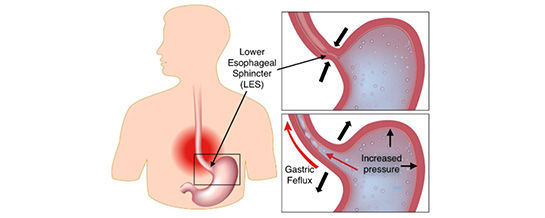How to Care for Your Child with Gastroesophageal Reflux Disease (GERD)
This leaflet will provide you with information about Gastroesophageal reflux disease (GERD) causes, symptoms, diagnosis, treatment and home care advice.

What is Gastroesophageal reflux disease (GERD)?
Gastroesophageal reflux (GER) is the passage of gastric contents into the oesophagus (the tube that carries food from the mouth to the stomach)
This condition becomes a disease and called Gastroesophageal reflux disease (GERD) when vomiting or spitting is associated with any of the symptoms below
This is a common condition in babies. If your baby spits up a lot of milk or formula after eating but seems otherwise happy and healthy, this is normal and very common most babies grow out of it without treatment.
Gastroesophageal reflux disease (GERD) is likely to happen in babies who
- Born prematurely (3 or more weeks before the due date)
- Are around people who smoke cigarette
- Have specific health problems, such as Down syndrome, cerebral palsy, or other problems with the brain or spinal cord
What are the symptoms of Gastroesophageal reflux disease (GERD)?
Your child may experience the following symptoms:
- Refuse to eat
- Arch the back and cry, as if in pain
- Choke on spit-up
- Vomit forcefully
- Not gaining weight normally
How is Gastroesophageal reflux disease (GERD) diagnosed?
The doctor will ask few questions about your child's health and examine your child. Your doctor will decide if further investigation or blood tests are required.
How is Gastroesophageal reflux disease (GERD) treated?
Uncomplicated reflux does not usually cause pain and usually does not need treatment.
Medicines do not always make the reflux better. Your doctor will be able to advise if your child condition requires treatment with medicine
The below actions may minimize symptoms:
Positioning
- Keep your baby upright in a head elevated position for 20–30 minutes after feeding
- Burp your baby after feeding
- For older children, raise the head of your child's bed 5 inches. This can help prevent reflux at night.
- Make sure your child's clothing is loose and comfortable, especially around the waist.
- Help your child lose weight if he or she is overweight.
Thickened feeds
- In bottle-fed babies, thickened feeds may reduce the frequency of vomiting
- "Anti-reflux" formulas are pre-thickened
Avoid Smoking
- If you or anyone in your house smokes, this can make your baby's reflux worse
Optimize feeds
- Consider a trial of smaller, more frequent feeds
- Consider a milk-free and soy-free diet
- The doctor might suggest that you try removing milk and soy from the baby's diet. Then see if your baby's reflux improves after a few weeks.
- Most babies who have trouble with milk or soy outgrow the problem by the time they are one year old.
- Avoid food and drink that can make GERD worse. These include:
- Chocolate, peppermint, fizzy drinks, and drinks that have caffeine
- Acidic foods such as vinegar, citrus fruits and juices, and tomato products
- High-fat foods such as french fries, fast food, and pizza
- Spicy foods
- Putting the baby in an infant seat (such as a car seat) right after feeding does not help with reflux and can make it worse.
- GER alone is not an indication to change the formula or stop breastfeeding
When should I seek medical advice?
Seek medical advice if your child:
- Has trouble swallowing or feels as though food gets "stuck" on the way down
- Loses weight
- Has chest pain
- Chokes when he or she eats
- Vomits blood
- Has specific health issues like Down syndrome, cerebral palsy, or other problems with the brain or spinal cord, and you are worried about reflux symptoms

